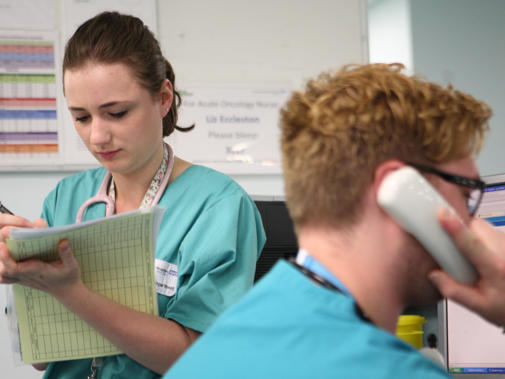I’m pleased to announce we have launched the fatigue and facilities charter for junior doctors in Wales.
This is a significant achievement and reflects the seriousness of the effect shift work and fatigue can have on junior doctors in Wales, and indeed many NHS Wales staff. While this agreement was made prior to the covid-19 pandemic, it’s perhaps now more important than ever.
As junior doctors, we are crucial to our patients, to our clinical teams and to the NHS, but we must remember that we are human. We know that reliable access to food and water, adequate rest and the length and quality of sleep have a sizable effect on mental health, cognitive function and overall morbidity.
We, and those who organise our training and employment/working environments, owe it to our patients, ourselves, our families and our colleagues to remember that all these factors and needs apply to us too. We are not invincible, and should not be expected to work as such, nor expect our colleagues to do so. I am very aware that I am only as effective as the team I work in.
Fatigue from normal working days and the additional effects of being on call do not finish when you hand over or switch off your bleep; you are still a tired doctor on your journey home, during the adjustment period between overnight and day shifts, during rest periods.
You cannot work or train effectively while overly fatigued. Having to tolerate unmanageable levels of fatigue not only affects patient safety but also affects the quality of our training opportunities and how we learn, having effects on the doctors we can be tomorrow.
We are entitled to safeguards such as breaks and time-limited shifts: they are built into our contracts and are essential and must not be disregarded in the face of increasing workplace pressures and rota gaps.
We are all stretched and trying to meet the needs of patients, colleagues and training programmes, but it’s so important that we make time to look after ourselves outside of working hours and that we are enabled to care for our own basic needs during working hours. We have long careers ahead of us where we can support, heal and comfort many people. Prioritising our own wellbeing is crucial. We can be the drivers of a change in culture if we work together as one profession.
So, what is the charter?
The charter, which was created by BMA Cymru in partnership with Welsh Government and NHS Employers, provides a comprehensive set of standards to be followed by health boards and trusts to begin to address the systemic causes of sleep deprivation and fatigue among doctors and ensure that NHS Wales is a safer place to work for junior doctors in training. Further joint working will of course be needed to make sure issues faced by junior doctors in Wales are solved.
It requires employers to provide good-quality facilities particularly, but not exclusively, for staff working at night and at the end of night shifts. When fatigue and tiredness do occur, mechanisms should also be in place to manage and alleviate this.
Poor facilities, combined with the psychological effect shift working can have on hard-working NHS staff, makes it difficult for junior doctors to have meaningful rest breaks. This should not be underestimated and junior doctors in Wales need to be assured that in caring for others, their own safety will also be taken seriously.
WJDC hopes this charter will be a catalyst for consistent improvements in working conditions and wellbeing in the workplace, along with promoting effective conditions for training and learning. This in turn allows junior doctors to provide the highest quality of care for patients.
It’s important to note that this charter is not a final destination but signifies a strong commitment to collaborative working between employers, junior doctors and local negotiating committees.
WJDC encourages junior doctors in Wales to join their local negotiating committees and to get involved in monitoring the implementation of the charter in their workplace.
More information
Read more about BMA work on fatigue and sleep deprivation
Please do also engage with us on Twitter or Facebook using the #F&FCharterWales

We have a range of services to support you.
- Counselling
- Peer support
- UK wellbeing support directory
Call our free and confidential helpline on 0330 123 1245

